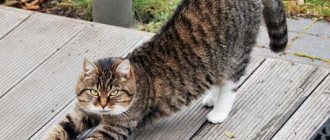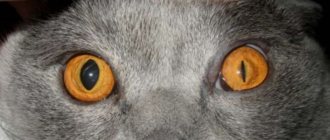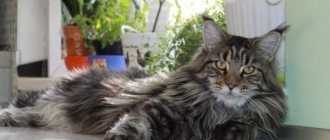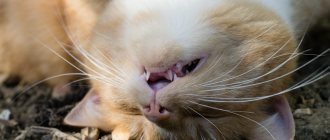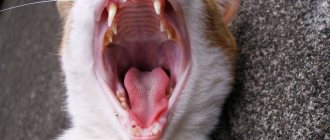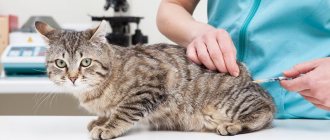Charming giants of the cat world - Maine Coons - give the impression of animals with good health. But for insidious diseases, the breed and size of the pet does not matter. Sooner or later, the owner of the coon is faced with a question about vaccination. When are Maine Coons vaccinated and how to prepare yourself and the animal for this procedure?
Maine Coon vaccinations - pros and cons
To do or not to do, that is the question. Veterinarians and breeders are still arguing about whether cats need vaccinations. It would seem that there is no discussion here, since vaccinations are done for the benefit of the pet:
- Vaccination helps prevent the development of serious diseases in Maine Coons. Some diseases can also affect humans.
- The immune system of the vaccinated animal is enhanced.
- Some vaccines are used not only for prevention purposes, but also for the treatment of infectious diseases.
- Vaccination will cost the owner much less than complex treatment for a sick Maine Coon.
- If an animal’s veterinary passport does not contain vaccination marks, it will not be possible to travel with it on trains or planes.
But some experts and breeders explain their non-acceptance of vaccinations with the following arguments:
- The administered vaccine is effective only in the first months after the injection.
- Vaccination reduces the production of natural immunity in animals.
- Many vaccines contain mercury and other heavy metals that can cause damage to your pet's nervous system and cancer.
Classification of vaccinations
There are generally accepted vaccination schedules, but for Maine Coons the schedule is selected individually. The classification is:
- Live vaccines. Most of these drugs are made from live pathogens that have lost the ability to cause disease, but in turn stimulate the immune system to produce protective antibodies.
- Inactivated vaccines do not contain live viruses, but are inferior to live vaccines in their effectiveness and are more allergenic than the former.
A mandatory vaccination not only for Maine Coons, but also for other animals, is a vaccination against rabies. This disease is deadly for pets, as well as for humans. Kittens must be vaccinated against plague, infectious and viral diseases, and leukemia. They are also vaccinated against panleukopenia, herpes, rhinotracheitis, chlamydia, calcivirus infectious disease and other dangerous viruses. Due to the fact that old vaccines do not work on new strains of viruses, drugs are constantly updated and often in complex ways.
We invite you to familiarize yourself with castration of a cat: the pros and cons of the operation and the veterinarian’s advice to castrate or not - Zverki.Click
When is vaccination required?
Many owners of Maine Coons and cats of other breeds are sure that if their pet does not go outside, it should not be vaccinated. Veterinarians are rushing to debunk this myth: even an animal that does not leave the walls of its home can become infected with a serious disease.
Some groups of pets are required to be vaccinated. These include:
- Animals that roam freely outside the home. By default, they can come into contact with their homeless brethren.
- Males and cats being prepared for mating.
- Pets that their owners are planning to temporarily rent to a pet hotel.
- Cats that are being prepared to travel abroad or attend exhibitions.
Animals taken from the street must also be vaccinated. Of course, it is difficult to imagine a purebred Maine Coon walking freely along the sidewalks. But if the owner was not sure that his pet had been vaccinated and there is no way to check this fact, it is better to contact a veterinary clinic.
Why is vaccination necessary?
Recently, many opponents of vaccination of people and animals have appeared. This phenomenon can only be explained by the high efficiency of vaccinations, as a result of which the number of diseases has significantly decreased.
Currently, vaccination of pets is not regulated anywhere, and some owners are in no hurry to get vaccinated, hoping to save money in this way or simply out of laziness.
Important! Be sure to deworm and treat for fleas and ticks before vaccination. The presence of parasites in a pet significantly increases the risk of allergic reactions.
A responsible owner strives to protect the life of his pet as much as possible. Modern vaccines of domestic and foreign production are safe, practically do not cause allergic reactions and are effective against many pathogens. In principle, if your coon does not walk outside, you can take a risk and not vaccinate. There are also several broad categories of cats for which vaccinations are required:
- walking outside the apartment;
- show cats;
- kitten producers;
- traveling with a cat owner;
- placed for foster care.
What diseases are Maine Coons vaccinated against?
Modern vaccines contain viruses of certain diseases. They are designed to protect Maine Coons from the most dangerous cat diseases. These include:
- Leukopenia. In common parlance - plague. This disease is very easily transmitted and very difficult for cats to carry. The main signs of the disease: fever, damage to the intestines, nasopharynx, heart.
- Rhinotracheitis. A dangerous disease that quickly “sticks” to cats. The pet becomes passive, lethargic, and discharge oozes from its eyes.
- Calcivirosis. The causative agent of this disease is not sensitive to most used disinfectants. Quickly adapts to the conditions around it. Sick cats experience conjunctivitis, body temperature rises, and the mucous membranes become covered with ulcers.
- Infectious peritonitis. Another common disease in cats, often leading to the death of the animal. Main signs: difficulty breathing, lack of appetite, swollen lymph nodes, fever.
- Leukemia. Viral leukemia is transmitted to a healthy animal after contact with a sick animal. The disease affects the hematopoietic system and increases the cat's susceptibility to infections. Typical signs of viral leukemia: depression, lack of appetite, exhaustion, reproductive dysfunction, enlarged lymph nodes, fever.
- Chlamydia. A highly contagious infectious disease, also called feline chlamydial conjunctivitis. Transmitted by airborne droplets, sexual contact and contact. Main symptoms: discharge from the eyes and nose, shortness of breath, lethargy, loss of appetite, frequent urination.
Vaccination against rabies is mandatory for Maine Coons and other cats. The owner must ensure that the animal receives the appropriate vaccine. After all, a sick pet can infect a person. A domestic cat can become infected with rabies after being bitten by a sick animal. Sometimes, for the saliva of a rabid animal to become infected, it is enough just to come into contact with the area of open wounds or the mucous membrane of a pet’s mouth.
The symptoms of the disease depend on the form of rabies. The most difficult thing to recognize is the atypical form. Signs of this disease resemble gastritis: diarrhea, vomiting, exhaustion. With a mild form of rabies, the cat becomes overly playful, literally intrusive. The owners of a sick pet may think that it is choking, but in fact this is how paralysis of the pharynx occurs. In the violent form of rabies, the cat becomes lethargic and aloof, tries to eat inedible objects, gnaw and lick the bite site through which the rabies virus entered.
Do I need to get vaccinated?
For cat owners, the need for regular vaccinations is not as clear-cut as for those who have a dog. Most cats live in city apartments and do not come into direct contact with possible sources of deadly infection. But there is one “but”: you yourself can bring the infection on shoes, clothes or other objects that have been in the external environment. The secretions of sick cats (saliva, urine, feces), and with them pathogens, enter the soil. You bring particles of this soil in the form of dust and dirt home on your shoes. This is a very likely scenario, although the risk is less than for animals walking outside. Don't rely on chance. Do not think that it is extremely unlikely that your cat will become infected in this way. When your cat actually gets sick, it won't matter to you whether the chance of infection was 50% or 0.5%.
For some diseases, the mortality rate is very high (for example, 50-70% of cats die when infected with panleukopenia). Rabies is fatal in 100% of cases, including in humans. You can become infected with rabies not only from other cats and dogs, but from almost any animal, including rats and mice, which are common prey for cats.
The vaccine contains a specific set of viruses that have been weakened or “killed” so they cannot cause disease. But their introduction into the cat’s body stimulates the production of antibodies. They accumulate in the body after the vaccine is administered, and when a live virus enters the body, the antibodies kill it. Even if vaccinated animals get sick, they tolerate the disease easily and in a non-life-threatening form.
Unvaccinated animals do not have these antibodies in their blood, and the body takes considerable time to produce them. And the more microbes that enter the body, the more antibodies are needed to neutralize them. Sometimes the animal’s body simply does not have time to produce the required amount of antibodies and the cat gets sick. In kittens, the immune system is not yet formed and works very slowly, so young animals are more susceptible to infectious diseases.
Features of vaccination of Maine Coons
Before vaccinating the charming giant Maine Coons, it is useful to familiarize yourself with the list of vaccines offered by veterinary clinics and the features of their use.
Types of vaccines
There are two main types of vaccines for cats:
- Alive. They include viral agents of the disease, only slightly weakened. Such viruses are no longer capable of developing the disease, but they force the body to produce appropriate antibodies.
- Dead (synthetic). Laboratory-derived vaccines. They contain dead cells similar to disease viruses. These cells are safe for the animal and cause an appropriate immune response. Such vaccines have a weaker effect compared to live strains of the disease, but are easier to tolerate in animals.
Modern vaccines are practically safe for Maine Coons and do not cause side effects. Of course, provided that the pet is healthy.
Another stumbling block in the selection of vaccines is the purchase of imported or domestic products. Modern veterinarians offer several developments for domestic cats:
- Multifel 4. It is considered one of the most effective Russian-made drugs. It creates lasting immunity. The vaccine is used to form an immune barrier against the most common cat diseases: panleukopenia, rhinotracheitis, calicivirus and chlamydia. Some experts consider one of the disadvantages of Multifel 4 to be the possibility of pet allergies and the absence of rhinotracheitis viruses in its composition.
- Nobivac - Tricat. Imported live vaccine. Contains weakened leukemia, chlamydia, rhinotracheitis and panleukopenia viruses. Nobivac - Tricat should be used with caution in debilitated cats. After vaccination, a deterioration in the animal’s condition is often observed.
- Felovax. A vaccine containing dead viruses, safe for Maine Coons. The drug contains weakened viruses of the four most common feline diseases: panleukopenia, rhinotracheitis, calicivirus and chlamydia.
- Quadrocket. Russian-made vaccine. Includes rabies, panleukopenia, herpes and calcivirosis viruses.
- Purevax. Helps to form stable immunity in Maine Coons to panleukopenia, infectious rhinotracheitis, calcivirus and chlamydia within two weeks after vaccination. The main contraindication to the use of Purevax is individual intolerance to the components of the vaccine.
- Microderm. The action of this live vaccine is aimed at combating lichen infection. Interestingly, the product has a healing effect. That is, with its help you can cure an already infected cat.
Many vaccines are combination vaccines. They include weakened strains of several diseases, for example, rhinotracheitis and calcivirosis. This approach is very convenient, because the animal receives two injections at a time, and not three or four.
Methods of administering the vaccine
The speed of action of the drug and the degree of subsequent protection depend on how the vaccine was administered. Any vaccination should be carried out taking into account the recommendations of the veterinarian or the manufacturer.
Thus, vaccines containing feline panleukopenia virus are administered subcutaneously or intramuscularly. Some vaccines (against peritonitis) are administered intranasally, in other words, as drops in the nose.
Preparing for vaccination
The owner of a Maine Coon can minimize the risk of developing side effects after vaccination. To do this, just follow a few simple preparatory steps:
- Make sure that the coon is absolutely healthy before vaccination.
- Ask your veterinarian what vaccines are available.
- If necessary, you can purchase an alternative to the vaccine offered by the clinic. The product is stored under suitable conditions.
- Purchase only modern vaccines.
- Two weeks before vaccination, the Maine Coon should be dewormed, that is, dewormed. Parasites reduce the body's immune strength.
Maine Coon vaccination schedule
Maine Coon vaccinations begin at a very tender age - 2-3 months. But the introduction of the first vaccine does not make sense without repeated revaccination. Next, the vaccine is given to prevent diseases at certain intervals.
Table: Maine Coon vaccination schedule
| Vaccine name | First vaccination | Revaccination | Subsequent vaccination |
| Panleukopenia | 8-12 weeks | After 2-3 weeks | Annually |
| Trichophytosis and microsporia | 8 weeks | 10 weeks | Annually |
| Rhinotracheitis | 8-12 weeks | After 2-3 weeks | Annually |
| Chlamydia | 10-12 weeks | After 2-4 weeks | Annually |
| Infectious peritonitis | 16 weeks | After 4 weeks | Annually |
| Rabies | 8-12 weeks | — | Once every 1-3 years (depending on the vaccine). |
| Calcivirosis | 8-12 weeks | After 2-3 weeks | Annually |
Types of vaccines and diseases
Opponents of vaccination insist that vaccinations are harmful because they weaken the immunity of animals that are supposedly not threatened by any external infection . Experience shows that this opinion is wrong: viruses easily penetrate from the street into an enclosed space, clinging to clothes and shoes. Maine Coons are vaccinated against the most “popular” feline diseases, including panleukopenia, rhinotracheitis, leukemia, calcivirus, chlamydia, herpes and rabies.
Vaccines
The list of in-demand biological products includes:
- Nobivas Tricat Trio (live) – herpes viral rhinotracheitis, panleukopenia, calcivirosis (Intervet, Holland);
- Nobivac Forcat (live) – panleukopenia, calcevirus infection, chlamydia, viral rhinotracheitis (Intervet, Holland);
- Leucorifelin (combined) – infectious rhinotracheitis, panleukopenia, calcivirosis (Merial, France);
- Fel-O-Vax 4 (inactivated) – panleukopenia, herpes viral rhinotracheitis, chlamydia, calcivirosis (Fort Dodge, USA);
- Quadricate (combined) – panleukopenia, calcivirosis, herpes viral rhinotracheitis, rabies (Merial, France);
- Purevax RCP/RCPCh (combined) – panleukopenia, infectious rhinotracheitis, chlamydia, calcivirosis (Merial, France);
- Multifel 4 (inactivated) – rhinotracheitis, panleukopenia, calcivirosis and chlamydia (Narvak, Russia);
- Polivak-TM/Microderm/Vakderm F – dermatomycosis (Russia);
- Nobivas Rabies (Holland)/Rabisin (France) – inactivated rabies vaccines;
- Purevax FeLV – leukemia (Merial, France); Primucell FIP (live) – viral peritonitis (Merial, France).
Viruses mutate, and some drugs are quickly replaced by others: biologists have to create vaccines that can fight new strains.
Vaccine selection
The owner of the Maine Coon is usually determined not so much by the type of vaccine (live, combined or inactivated), but by the country of origin. The veterinary clinic will always ask whether a domestic or imported drug should be administered to the pet. If you are short on funds, opt for the Russian vaccine; if you are not going to save money, opt for an imported one.
Important! You will also need a foreign drug if you intend to travel with your Maine Coon outside the country. Most countries recognize vaccination carried out exclusively with European drugs. The names of the vaccines, as well as the dates of their administration, must be indicated in the international veterinary passport.
Return to content
What to do after vaccination
After vaccination and revaccination, the Maine Coon needs to be quarantined. The latter is necessary so that the animal that has been vaccinated has time to develop antibodies to the disease. While in quarantine, the Maine Coon should not go outside or have contact with other animals.
An isolated pet needs to be fed well and provided with rest. It is better to discuss the specific diet during this period with your veterinarian.
The exact period of isolation depends on the type of vaccination and the general condition of the kitten or adult. The more complex the vaccine (it protects against more diseases), the more difficult it is for the cat’s body to produce antibodies. Consequently, the pet needs more time to adapt.
The average isolation period is 7-14 days. The exception is the rabies vaccination. After it, the Maine Coon must be in quarantine for at least 30 days.
When to avoid vaccinations
Immunization is contraindicated for the following categories of Maine Coons:
- under 2 months of age;
- those who have recently undergone surgery;
- patients (including those undergoing treatment);
- have not undergone deworming procedure;
- experiencing prolonged stress;
- pregnant and lactating women;
- being in a state of estrus.
These cats cannot be vaccinated, as the vaccine can not only cause negative consequences, but also cause the death of the animal . Helminths are included in the list of contraindications due to their ability to clog the body with toxins that suppress the immune system's response to vaccination.
Return to content
Possible complications after vaccination
After administering the vaccine, the owner should observe the animals for a week. During this period, a number of signs and symptoms may appear that are the result of an allergy to the biocomponents of the drug. The most common side effects from the vaccine are:
- inflammation of the skin at the injection site;
- diarrhea and vomiting;
- apathetic state.
Important. If the Owner has observed at least one of these symptoms in the cat, the animal should be immediately shown to a veterinarian.
Possible complications and consequences
These tips will be useful for those who are planning to vaccinate a cat on their own. First, you need to preserve the active properties of the vaccine, so along with it, buy ice in a package intended for transporting medications.
During transportation, do not allow sunlight to reach the vaccine, and after delivering it home, store it according to the instructions . By violating the storage conditions, you will negate the entire effect of the vaccination. Use a disposable (sterile) syringe, releasing excess air from it before the injection: where to administer the vaccine, intramuscularly or subcutaneously, is indicated in the instructions.
Even if this is not the first vaccination that you do yourself, stock up on antihistamines (diphenhydramine, suprastin, tavegil) and glucocorticoids (dexamethasone, prednisolone) in advance. They will help save the Maine Coon from anaphylactic shock, which, although rare, is very dangerous. The cat has the following symptoms:
- general weakness;
- swelling (especially dangerous in the larynx area, as it leads to suffocation);
- shortness of breath and cramps;
- nausea and vomiting;
- involuntary urination/defecation.
This is interesting! As a rule, anaphylactic shock is observed 3–15 minutes after vaccination, occasionally when the vaccine is administered (“on the needle”), sometimes two hours after the drug enters the body.
When anaphylactic shock occurs:
- put ice on the injection site and pull it higher with a tourniquet;
- administer prednisolone (0.3–0.6 ml/kg) or diphenhydramine (0.1–0.3 ml/kg) intramuscularly.
Deworming before vaccination
Before vaccination, you MUST deworm your cat, regardless of the last time you did it. The presence of diseases and parasites weakens the immune system and, as a result of vaccination, insufficient antibodies may be produced, then even a vaccinated cat can get sick. This is called “breakthrough of post-vaccination immunity.” In addition, if a cat has worms, vaccination can cause serious complications, including death.
Anthelmintic can be bought at a veterinary pharmacy or pet store, but under no circumstances in a tent or on the market, where it may turn out to be a fake. Some good medicines for worms: Kanikvantel, Polyvercan, Cystal-Cat, Drontal.
After anthelmintic, if the cat does not poop after a day, you need to give Vaseline oil. Pour 3-5 ml from a syringe without a needle into your mouth 2-3 times after 1-2 hours and wait for the result. After 10 days, deworming must be repeated, since the medicine does not affect the eggs and larvae of worms. After deworming, you need to wait until the larvae mature and kill the newly born worms in the second dose. Here it is important not to wait too long and poison the young worms before they reach sexual maturity and have time to lay new eggs. Sexual maturity in most types of worms occurs after 14-20 days. There is also no need to rush too much - you need to poison when ALL the larvae have already turned into worms. An interval of 10 days is the optimal period.
What vaccines?
Modern developments are making vaccines more useful and safe. The drugs are being improved to be relevant for new strains of viruses. Vaccines of domestic and imported production are available for Russian cat owners.
The vaccine is used to build immunity against the most common cat diseases. This is one of the most effective Russian drugs, creating a stable immune barrier against infections. Online reviews indicate the possibility of allergic reactions and the absence of rhinotracheitis as disadvantages.
Domestic drug with complex action. Contains rabies viruses, so veterinarians recommend using it at a later age - the first vaccination is given only at 3 months. Using Quadriket is safe and suitable for pregnant cats.
The vaccine creates strong immunity in Maine Coons. The drug forms lasting immunity after 2 weeks. A contraindication to the use of the vaccine is individual intolerance to the components.
The first vaccination of a Maine Coon kitten is an important stage in your pet's life. To make sure everything goes as smoothly as possible, carefully select a doctor and a vaccine. The health of your Maine Coon is in your hands.
From the first days when a fluffy little baby appeared in your home, you should take care of timely vaccination. The first vaccination for a Maine Coon kitten is carried out at the age of 2-3 months, and all information about it is recorded in a special veterinary passport. In terms of importance, this event can be compared to the first issue of a passport.
More details in the article:
Vaccination procedure
Even if you decide to entrust the vaccination to a veterinarian, you should know some general points in order to properly prepare your pet for the procedure:
1. In order for immunity to develop correctly and vaccination to take place without negative consequences, the animal must be healthy. Therefore, before vaccination, the veterinarian examines the cat, takes the temperature, and interviews the owner. It is also not recommended to vaccinate pregnant cats with vaccines containing live viruses;
2. 10-14 days before visiting the veterinarian it is necessary to carry out deworming. To do this, you should buy drops or tablets at any pharmacy. It is better to save the packaging - the veterinarian will paste the sticker from the drug into the veterinary passport. Without deworming, you will be denied vaccination;
3. You should take your pet to the clinic on an empty stomach, otherwise vomiting and diarrhea may occur due to stress or the vaccination itself. Take a towel or special diaper with you;
4. in the clinic, an unvaccinated kitten should not have contact with the environment and other animals;
5. the procedure itself lasts less than a minute, regardless of which drugs were chosen;
6. after vaccination (usually after re-vaccination), the veterinarian will issue a veterinary passport for the kitten. In most clinics this service is free or very inexpensive. The veterinary passport contains information about all vaccinations; if necessary, on the basis of this, a veterinary certificate is issued for transporting the animal on public transport or exporting it abroad.
Get vaccinated!
Only completely healthy coons can be vaccinated. Therefore, before vaccination, the doctor carefully examines your pet and measures its body temperature. When choosing a vaccination schedule for your kitten, your veterinarian must take into account the condition of the kitten and the circumstances of its acquisition. It is prohibited to vaccinate:
- kittens under 2 months of age;
- cats in heat, pregnant and lactating;
- weakened and sick animals.
The special composition of the vaccine does not cause disease, but at the same time awakens the body's defenses. Trained by training, the body's brave immune cells - T-lymphocytes - after exposure to the vaccine, know how to fight the disease and will not allow it in the future.
The first vaccination of cats at two months is comprehensive. It creates protection against rhinotracheitis, panleukopenia, calicivirus and feline chlamydia. After three weeks, revaccination is carried out with the same vaccine, due to which lasting immunity to these diseases is developed within 2 weeks. Since the kitten’s body is slightly weakened in the process of producing antibodies to infections, it is recommended not to contact other animals at this time.
If the first Maine vaccination was not carried out at 2-3 months, it is recommended to wait a little and try to vaccinate your furry pet after 6 months. By this time, the kitten’s body has already become sufficiently strengthened, and revaccination is not required. In the future, it is necessary to vaccinate once a year.
Often, along with revaccination at 3 months, the kitten is vaccinated against rabies. This vaccination is mandatory and is given free of charge every year. Some experts note that Maine Coons over a year old should be vaccinated against rabies, and trips to nature should be limited until that time.
All vaccines are updated regularly. Their creators are trying to take into account new emerging strains of viruses. Together with your veterinarian, you can choose a domestic or imported vaccination that is most suitable for your pet.
Kitten vaccination schedule
The first vaccination (complex) is given to a Maine Coon at the age of 2 months and 10 days.
It is designed to protect against several major diseases:
- panleukopenia;
- calcevirus infection;
- herpes viral rhinotracheitis;
- chlamydia.
The effect of the first vaccination should be supported by revaccination (carried out exactly three weeks later), therefore, the Maine Coon receives the second vaccination at three months. Repeated vaccination is usually supplemented by a rabies vaccine, but not all doctors support this practice. There are two arguments:
- This is a difficult vaccination, often leading to undesirable consequences;
- It is almost impossible to get rabies while at home.
This is interesting! If Fel-O-Vax 4 (USA) is used, the first vaccine is administered at 2–2.5 months, followed by a booster dose 2.5 weeks later.
If you intend to exhibit your Maine Coon, you will need to vaccinate it against rabies a month before the event (but not earlier than the cat is 3 months old). Please note that rabies vaccination is done exclusively in the clinic, while complex vaccination is allowed to be done in a nursery.
The next comprehensive immunization is carried out exactly at 12 months, and at the same time cats not involved in exhibitions are vaccinated against rabies. All subsequent revaccinations of the Maine Coon are carried out once a year.
How does vaccination work?
At the owner’s request, the animal can be vaccinated in a clinic, private or public, as well as at home or in a nursery, having first called a doctor.
Maine Coons are vaccinated for the first time at two months, the next at three months, the third when the animal is one year old, and then vaccination is carried out annually or every two years (according to the European system).
There are a number of restrictions for vaccination. It is prohibited to vaccinate:
- sick cats and cats;
- pregnant and lactating cats;
- cats in heat;
- kittens up to 2 months;
- weakened or stressed animals;
- animals that have not undergone deworming.
The vaccination schedule is selected for each Maine Coon individually. 10 days before vaccination, the animal must be dewormed. Vaccinations are only allowed for a healthy Maine Coon, so before the procedure the kitten must be examined, its temperature taken, and only if there are no signs of ill health can the vaccine be administered.


